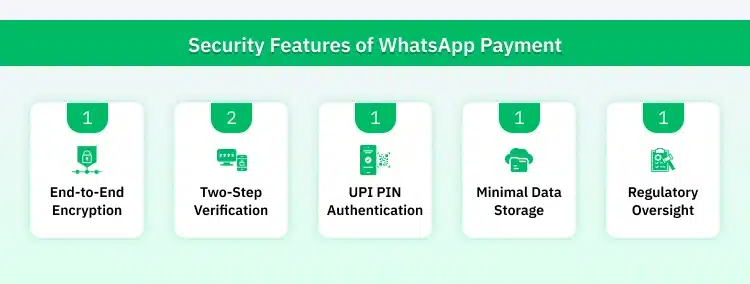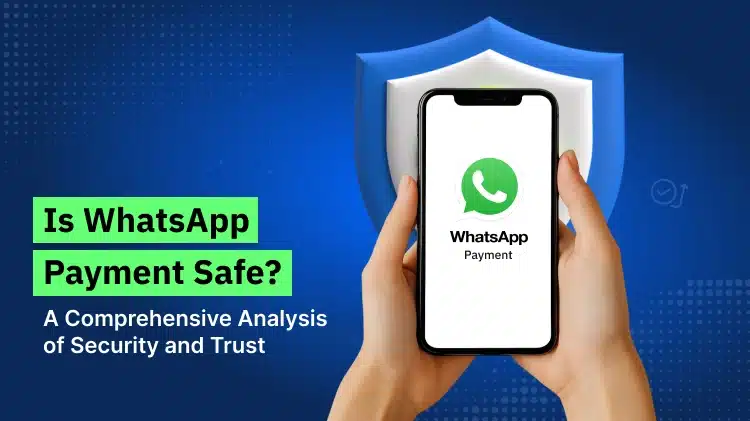Is WhatsApp Payment Safe? A Complete Analysis of Security and Trust
With WhatsApp on smartphones, now handling everything from chats to banking, it’s natural to ask: Is WhatsApp payment safe?
WhatsApp has entered the digital payments space with its UPI-powered feature called WhatsApp Pay, simplifying the way people transfer money.
Still Thinking if WhatsApp Payment is Safe or Not?
Explore with us how WhatsApp Pay stacks up in safety and ease!
- Understanding WhatsApp Payments: How It Works
- Security Features of WhatsApp Payment: What You Need to Know
- Risks and Vulnerabilities: Are You Doing Unsafe Transactions?
- User Experiences: Real Stories About Using WhatsApp Payments
- Comparing WhatsApp Payment with Other Digital Payment Platforms
- Best Practices for Ensuring Safe Transactions on WhatsApp Payments
- Conclusion
- Frequently Asked Questions
Table of Contents
Understanding WhatsApp Payments: How It Works
So, how it works? WhatsApp Pay uses the Unified Payments Interface (UPI), enabling direct peer-to-peer payments from one bank account to another—right within the chat. There’s no need for a separate digital wallet. Once you link your UPI-enabled bank account, sending or receiving money is as easy as sending a photo. And just like managing sensitive data with a self hosted password manager, WhatsApp Pay ensures that your financial transactions stay secure and private.
The process is straight and simple. You open a chat, tap on the payment option, enter the amount, and confirm with your UPI PIN. The transaction is instant and recorded in your conversation.
WhatsApp payment is safe in terms of setup—it’s minimal, needs authentication, and uses your existing bank infrastructure. For millions who already depend on WhatsApp for everyday communication, having a payment facility integrated into their chat app feels easy, natural, and convenient.
Security Features of WhatsApp Payment: What You Need to Know
When it comes to digital transactions, security is non-negotiable. So naturally, many users wonder: Is WhatsApp UPI safe?

Below is a breakdown of some robust security features offered from WhatsApp:
- End-to-End Encryption: WhatsApp messages are end-to-end encrypted and reflects this protection benefit for payment facility, too. This makes sure that your transaction details are secured and safe totally, not even shared with WhatsApp.
- Two-Step Verification: This another feature of security. Even the phone is with some other person, he can not process the payment further, as WhatsApp verification code and UPI Pin is confidential with the user only.
- UPI PIN Authentication: Every transaction requires the user to enter a secure UPI PIN. This adds a banking-grade level of verification.
- Minimal Data Storage: WhatsApp doesn’t store your bank or card details. All sensitive information remains with your bank, adhering to data privacy laws.
- Regulatory Oversight: In India, for example, WhatsApp Pay is governed by NPCI, the same body that regulates all UPI apps. This is an assurance for a standardized level of safety.
So, is WhatsApp Pay safe? Yes. At least from a technical and regulatory standpoint, it holds up well. The app is full of features you’d expect from any leading payment solution.
Risks and Vulnerabilities: Are You Doing Unsafe Transactions?
WhatsApp Payments has got its way with risks. In a growing country like India, where users are least aware of their transection’s safety or terms like cybersecurity.
Another major concern is phishing. Cybercriminals mostly imitate WhatsApp’s interface. They act as customer support agents to trick users into getting sensitive data like UPI PINs, OTPs, or bank details. Unlike traditional banking apps with strong firewalls and fraud monitoring systems, WhatsApp Payments depends heavily on the user’s device security and the protocols of the linked bank’s UPI infrastructure. If your phone is tampered with—whether through malware, an unsecured Wi-Fi network, or unauthorized access—your financial data could be at serious risk.
Another concern is the limited redressal mechanism. If a transaction fails or money is debited incorrectly, users mostly find themselves in a loop between WhatsApp and their bank, with no clear resolution path. Also, there are privacy issues.
WhatsApp collects Metadata: Payments get processed smoothly several times. Users must take extra alerts by giving biometric locks, checking on passwords, updating the app regularly, being aware of social scams, fraudsters, unknown but familiar links to avoid, etc. This will keep their all transactions safe always.
While the technical setup is strong, the human side of the equation can be vulnerable. Many people still ask whether WhatsApp payment is safe or not. The answer lies in understanding the potential risks.
- Cybersecurity Threats: WhatsApp itself is secure, but still the devices it is running on are not. If your phone is captured with spyware or malware, your payment data is still unsafe.
- Fraud and Scams: Scammers mostly use WhatsApp to approach people you know and request for money. The payment features are prone to fall into the traps like financial scams easily.
- Phishing Links: Fraudsters often send malicious links, asking users for revealing personal details or installing harmful apps.
- UPI PIN Leaks: If someone tricks you into sharing your PIN—perhaps posing as a bank employee—you’re vulnerable. And WhatsApp would be unable to reverse unauthorized transactions.
- App Glitches: Some users report temporary bugs like the WhatsApp Business payment option not showing or getting stuck with errors like “couldn’t set UPI number.” While these are usually fixable, they can cause temporary disruptions.
So, while WhatsApp payment is safe, users still need to stay alert. No app, no matter how secure, can protect you from poor transection judgement or external threats beyond its control.
User Experiences: Real Stories About Using WhatsApp Payments
What better way to assess safety than hearing from the people who use it? Users often debate online whether WhatsApp Pay is safe in real-life use. Their feedback gives us a grounded look at how things go.
Positive Takeaways: For many users, WhatsApp Pay is a breath of fresh air. It’s easy, convenient, and integrates smoothly with their daily chats. People use it for everything from rent payments to splitting restaurant bills.
“I was skeptical at first and kept asking myself if WhatsApp payment was safe or not. But over time, I’ve sent money to friends, house help, and even shopkeepers—no issues so far,” says Aditi, a teacher from Delhi.
Frustrations and Concerns: Others have had hiccups. Ramesh from Bangalore shared, “When I helped my father set it up, we kept getting the error ‘couldn’t set UPI number.’ It took several tries before it worked.”
Then some find the WhatsApp Business payment option not showing, especially after app updates. While not exactly safety concerns, these bugs create doubt in users’ minds.
Overall, most negative stories stem from usability rather than breaches. However, they do underline the importance of consistent support and user education.
Confused About Whether WhatsApp Payment is Safe?
Read our in-depth guide to find out if WhatsApp UPI is safe for your daily use.
Comparing WhatsApp Payment with Other Digital Payment Platforms
Compared to other digital payment apps, the WhatsApp business payment option still feels quite minimalistic. While it’s integrated into a platform people use daily for chatting, it lacks the full-stack functionality that apps like Google Pay, PhonePe, or Paytm offer. These platforms go beyond simple peer-to-peer transfers—they support everything from utility bill payments and investment options to scanning QR codes at retail stores. On the other side, WhatsApp’s UPI feature is more limited in scope. This gap is especially noticeable for small businesses and merchants.
Moreover, when users face a WhatsApp payment processing problem or encounter issues like the WhatsApp business payment option not showing, the resolution process isn’t always straight.
Unlike more mature apps with dedicated help centres and transaction insights, WhatsApp often redirects users to their banks, leaving many confused about whom to approach. Even though it is secure and easy to use, it doesn’t yet offer advanced features. They are like transaction cashback rewards, history breakdowns or instant support—features that today’s digital-first users expect.
Until these gaps are bridged, WhatsApp Payments may remain a comfortable but basic choice in a crowded market of feature-rich UPI apps.
To get a balanced perspective, it helps to compare WhatsApp Pay with some big names in the digital payment’s world.
Let’s look at how it fares:
- PayPal: A global payment giant, PayPal supports international payments and includes strong buyer protection. But it’s not as tightly integrated into your social life as WhatsApp. Plus, PayPal charges fees, whereas WhatsApp Pay is free.
- Venmo: Popular in the U.S., Venmo is designed for social payments—you can see who paid whom. However, that public feature has raised privacy concerns. WhatsApp, being chat-based, keeps your transactions private.
- Google Pay / PhonePe / BHIM: These UPI-based apps are WhatsApp Pay’s real competitors in India. They offer more features like bill payments, recharges, and rewards. But WhatsApp scores on simplicity. It’s familiar and doesn’t require another app download.
So, is WhatsApp UPI safe when compared to these? Absolutely—it uses the same UPI backend. However, it’s still catching up on features and customer support.
Best Practices for Ensuring Safe Transactions on WhatsApp Payments
Even the safest app can be risky if used carelessly.
Find here some smart tips to make sure you use WhatsApp Pay securely:
- Enable Two-Step Verification: Always turn this on in your settings. It prevents unauthorized access if your phone is lost or stolen.
- Never Share Your UPI PIN: This cannot be given to any other person. Think of your UPI PIN like your ATM code. Keep it to yourself.
- Double Check Before You Pay: If someone you know suddenly requests money, call and confirm. Don’t act on impulse.
- Look for Phishing: Do not click on unknown links—even if they have come from a friend or a contact. If something feels fishy, it is mostly.
- Keep Your App Updated: Updates ften contain vital patch management fixes. Staying current means staying protected.
- Secure Your Phone: Use a strong passcode or biometric lock. It adds another layer of protection beyond the app.
- Track Your Transactions: Activate SMS or email notifications from your bank to keep tabs on all activity.
Following these tips can turn WhatsApp Pay into a reliable everyday tool rather than a risk.
Conclusion: Is it Worth Using? Making an Informed Decision About WhatsApp Payments
So, after all this, let’s return to the core question: Is WhatsApp Pay safe? Or put in another words: WhatsApp payment is safe or not?
From a technical standpoint, WhatsApp Pay offers industry-standard security: end-to-end encryption, UPI-based transactions, and regulatory compliance. These safeguards reflect the same expertise you’d expect from a mobile banking development team focused on delivering secure and user-friendly financial solutions. It doesn’t store sensitive data and works within the trusted WhatsApp ecosystem.
But it’s not fully proofed. There are risks, especially around scams, social engineering, and occasional technical bugs. It is vital for users to be vigilant and alert always.
In other words, one can say WhatsApp payments is safe to work among your well-known contacts, friends, relatives and known vendors etc. It is the most convenient, fast and available app for such types of financial transactions.
To answer it plainly: Yes, WhatsApp payment is safe, if you use it wisely. Combine smart practices with the app’s security features, and it becomes a trusted tool for modern money transfers.
To avail these WhatsApp Payment facilities and features along with it, you can draft your requirement mail to us on info@webmaxy.co.
Need Help Navigating your WhatsApp Automation or Payments?
Our expert team at WebMaxy is just a message away.
Frequently Asked Questions
Yes, WhatsApp payment is safe for everyday use. But still, users must avoid sharing their personal information and confirm the recipient’s identity before making a payment each time.
If you’re getting the “couldn’t set UPI number” error, first ensure that your mobile number is the same one linked with your bank account. Double-check your SMS permissions and network connection. You may also want to reach out to your bank to confirm your account is UPI-ready. Restarting the app or phone often helps fix setup glitches.
Not easily. Even if someone has your phone, they will still need your UPI PIN to authorise any transaction. WhatsApp gives two-step verification- another security layer. However, it’s still advised to lock your phone with a digital or biometric passcode and not to share any sensitive info via messages or online.
To erase your UPI account from WhatsApp, refer to ‘Payments’ under WhatsApp settings, click on the linked bank account by you, and select the option to remove or unlink it. This will stop further payments through WhatsApp Pay. Make sure no pending transactions are active before removing your bank details.
Adam Wilson
Adam Wilson comes with an experience of 12+ years in the IT industry. As a Customer Success Manager, he has been researching and trying to understand the customers’ behavior in different scenarios. He has also studied human psychology to relate it to the purchase journey of the customers. His published books on customer psychology and behavior have received many honors and awards from various enterprises.



